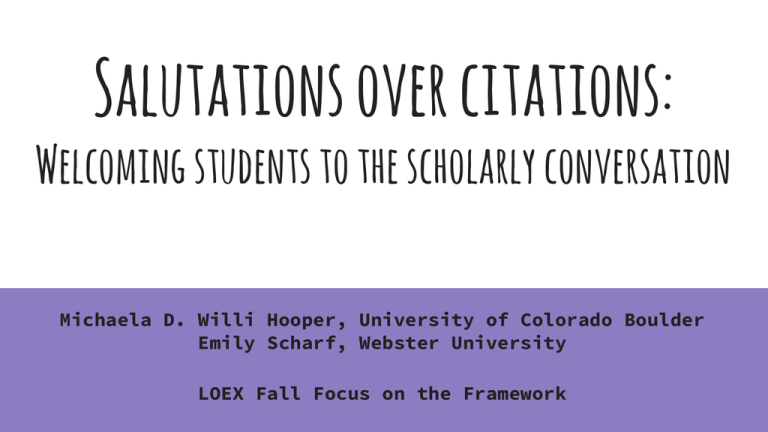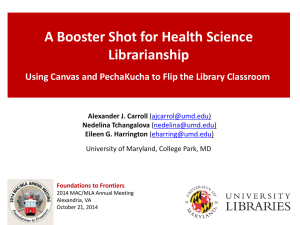Salutations over citations: Welcoming students to the scholarly conversation
advertisement

Salutations over citations: Welcoming students to the scholarly conversation Michaela D. Willi Hooper, University of Colorado Boulder Emily Scharf, Webster University LOEX Fall Focus on the Framework Photo by Rebeck96; CC0 Public Domain; https: //pixabay.com/en/welcome-sign-garden-sign-760358/ Learning outcomes 1. Participants will identify teaching strategies/activities with which to teach the ACRL frames 'scholarship is a conversation' and 'authority is constructed and contextual.' 2. Participants will integrate conversations about social media in their own teaching strategies for these two frames. 3. Participants will analyze the ways that the frames and social media challenge current academic systems and present the possibility for more voices to be heard. Learning concepts referenced by the Framework Students must grasp transformative threshold concepts to understand a domain (Meyer, Land, and Baille, 2010). Photo by james bretz; CC BY-NC-ND 2.0; http://bit.ly/1G43GTc Learning concepts referenced by the Framework Metaliteracy positions learners as contributors to the increasingly social information landscape. Critical thinking and metacognition are necessary to adapt to this participatory and dynamic landscape. Photo by hackNY.org; CC BY-SA 2.0; https://www.flickr. com/photos/hackny/5685783242 Learning concepts referenced by the Framework Metacognition is the ability to recognize, analyze, and adapt one’s own thinking. Photo by cristian arismendi; CC NC-ND 2.0; https://www.flickr. com/photos/unisono/51672417 Learning concepts referenced by the Framework “Metaliterate Learner Graphic” by Roger Lipera; CC BY-NC-SA 3.0; http://metaliteracy.cdlprojects. com/what.htm Other theories that influenced us Constructivism - Learners construct knowledge from their experiences and interactions with one another. - Learners assimilate new knowledge with prior knowledge. Photo by Kevin Dooley; CC BY 2.0; https: //www.flickr. com/photos/pagedooley/1455535497 Other theories that influenced us Transformative Learning - The goal of adult education is to foster learners’ ability to critically reflect upon their assumptions (“frame of reference”) and engage in dialectic discourse. - Transformation is affective as well as cognitive and follows a disorienting event. Discussion questions - What communities are you part of? How is someone judged as authoritative in your communities? - Have you seen any recent news stories about social media or online communities? What questions or concerns do they raise? - Do you know what your privacy settings are? Do you understand the terms and agreements for the communities you are part of? - What are some of the benefits of traditional scholarly communication? What are some benefits of social media and online communities? Community examples AVEN (Asexuality Visibility and Education Network) Community examples Bullying and exclusion within gaming communities Community examples Facebook’s Mood Manipulation experiments Community examples LOC Twitter archive Community examples Genius.com song lyric annotations Students wonder: Peer-review systems are helpful, but why can’t academics do better about writing for “everyday folk?” Using reddit to teach scholarship as a conversation Community With rules Who is here? Who is not here? Photo by evablue; CC BY 2.0; https://www.flickr. com/photos/evablue/5282805183/ Reddit community rules https://www.reddit.com/r/Teachers https://www.reddit.com/r/AskSocialScience Activity Take a pop culture or news topic and discuss it with a partner. Sample social media/news topics #ConcernedStudent1950 at University of Missouri #FightFor15 to get the minimum wage to $15/hour #IceBucketChallenge for ALS #YesAllWomen examples of misogyny and violence against women #BlackLivesMatter during and after Ferguson #BringBackOurGirls schoolgirls kidnapped by Boko Haram Activity example Ryan Adams released a cover album of Taylor Swift’s 1989 in August. There are those who think the gender politics here are unfortunate. The reviews are generally positive. Those left out of the conversation might include people who aren’t fans or those who do not have easy access to music. Then ask students: where would you fit in this conversation? How is this conversation similar to academic scholarship? How is it different? What about the discipline of music? Photo by mj ecker; CC BY-NCND 2.0; https://www.flickr. com/photos/mjecker/2944963 Activity Take a pop culture or news topic and discuss with a partner: 1. 2. 3. 4. 5. What does the conversation around this topic look like? Who participates in this conversation? Are there sides to take and what are they? Who is left out of this conversation? Who are the gate-keepers or standard-setters for this conversation? 6. How would you use this in your instruction to bridge the gap to talk with students about scholarly communication? Photo by Marc Wathieu; CC BY-NC 2.0; https://www.flickr. com/photos/marcwathieu/2980385784/ Thanks! Questions? Michaela.WilliHooper@colorado.edu emilyscharf99@webster.edu Bibliography Francke, H. & Mansour, A. (2015). Information activities in social media. Retrieved from https://iilresearch.wordpress.com/2015/05/05/informationactivities-in-social-media/ Hofer, A., Townsend, L. & Brunnetti, K. (2012). Troublesome concepts: Investigating threshold concepts for information literacy instruction. Portal: Libraries and the Academy, 12(4), 387-405. Mackey, T. P., & Jacobson, T. E. (2010). Reframing information literacy as a metaliteracy. College & Research Libraries, 72(1), 62-77. Meyer, J. H., Land, R., & Baillie, C. (2010). Threshold concepts and transformational learning. Rotterdam, The Netherlands: Sense. Mezirow, J. (2003). Transformative learning as discourse. Journal of Transformative Education, 1(1), 58–63. Perkins, D. (1999). The many faces of constructivism. Educational Leadership, 57(3), 6–11. Rubick, K. (2015). Flashlight: Using Bizup’s BEAM to illuminate the rhetoric of research. Reference Services Review, 43(1), 98–111. doi:10.1108/RSR10-2014-0047 Taylor, E. W. (2010). Transformative learning theory. New Directions for Adult and Continuing Education, 119, 5-15. doi: 10.1002/ace.301 Taylor, E. W., & Cranton, P. (2012). The handbook of transformative learning: Theory, research, and practice. San Francisco, CA: John Wiley & Sons. Veenman, M. V., Van Hout-Wolters, B. H., & Afflerbach, P. (2006). Metacognition and learning: Conceptual and methodological considerations. Metacognition and Learning, 1(1), 3–14. http://bit.ly/1NvVuik


